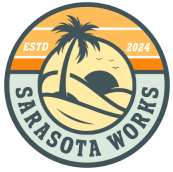Introduction
Reentering the workforce after a career break can be a daunting task. Whether you stepped away to raise a family, further your education, travel, or other personal reasons, returning to the job market often involves overcoming various challenges. However, with a strategic approach, it’s entirely possible to make a successful transition back into the professional world. This guide aims to provide career changers with actionable steps to regain their footing and thrive in their new roles.

Join over 12,836 active members in our Facebook Group : https://www.facebook.com/groups/sarasotaworks
1. Understanding Your Motivation
Before diving back into the job market, it’s crucial to understand why you want to return to work. Self-assessment can help clarify your career goals and motivations, which will guide your job search and decisions.
Tips for Self-Assessment:
- Reflect on Your Interests: Think about what excites you and where your passions lie. This will help you target roles you’ll find fulfilling.
- Assess Your Strengths and Weaknesses: Identify your core competencies and areas for improvement to better align with your desired career path.
- Set Clear Goals: Determine what you want to achieve in your career, whether it’s financial stability, personal growth, or professional fulfillment.
2. Building Confidence
Confidence is a significant hurdle for many returning professionals. It’s not uncommon to experience self-doubt after a prolonged break. However, there are strategies to rebuild your confidence.
Strategies for Building Confidence:
- Personal Development: Engage in activities that boost your self-esteem, such as reading professional development books, attending workshops, or practicing mindfulness.
- Networking: Surround yourself with supportive professionals who can provide encouragement and advice. Attend industry events and join professional groups to expand your network.
3. Upgrading Skills
The job market is continuously evolving, and it’s essential to stay updated with the latest skills in your target industry.
Guidance on Upgrading Skills:
- Identify In-Demand Skills: Research job listings in your desired field to identify the skills employers are looking for.
- Online Courses and Workshops: Platforms like Coursera, Udemy, and LinkedIn Learning offer courses that can help you gain new skills.
- Certifications: Obtain certifications in relevant areas to enhance your resume and demonstrate your commitment to professional growth.

4. Networking and Mentorship
Building a professional network and finding a mentor can provide invaluable support during your transition back to work.
Advice on Networking and Mentorship:
- Join Professional Associations: Become a member of industry-specific associations to connect with like-minded professionals.
- Attend Career Fairs and Networking Events: These events offer opportunities to meet potential employers and peers.
- Seek Out Mentors: Find experienced professionals who can offer guidance, share their experiences, and provide insights into your target industry.
5. Crafting a Winning Resume and Cover Letter
Your resume and cover letter are critical tools for showcasing your qualifications and experiences. Tailoring them to highlight your skills gained during your career break is essential.
Tips for Crafting Application Materials:
- Focus on Transferable Skills: Emphasize skills that are applicable to the job you’re seeking, even if they were acquired outside a traditional work setting.
- Include Volunteer Work and Freelance Projects: These experiences can demonstrate your capabilities and commitment.
- Be Honest About Your Career Break: Briefly explain the reason for your break in your cover letter, focusing on the positive aspects and what you’ve learned.
6. Navigating the Job Search
An effective job search strategy is key to finding the right opportunities.
Strategies for Job Searching:
- Leverage Online Job Boards: Sites like Indeed, Glassdoor, and LinkedIn are excellent resources for finding job listings.
- Attend Career Fairs: These events can provide direct access to recruiters and hiring managers.
- Use Social Media: LinkedIn is a powerful tool for building your professional network and connecting with potential employers. Regularly update your profile and engage with industry content.
7. Interview Preparation
Preparing for interviews is crucial to making a positive impression and addressing any questions about your career break.
Steps for Interview Preparation:
- Practice Common Interview Questions: Rehearse your responses to typical questions, including how you’ve stayed productive during your break.
- Research the Company: Understand the company’s mission, values, and culture to tailor your responses.
- Prepare Your Career Break Explanation: Develop a brief, positive explanation for your career break and focus on the skills and experiences you’ve gained during that time.

8. Onboarding and Beyond
Securing the job is just the beginning. A smooth transition into your new role and early success are crucial for long-term satisfaction and growth.
Strategies for Onboarding and Success:
- Familiarize Yourself with Company Processes: Understand the company’s workflows and expectations early on.
- Seek Feedback: Regularly ask for feedback from your manager and peers to continuously improve your performance.
- Set Short-Term Goals: Establish achievable goals for your first few months to build momentum and confidence.
Conclusion
Reentering the workforce after a career break requires careful planning, self-assessment, and proactive efforts. By understanding your motivations, building confidence, upgrading your skills, and leveraging your network, you can successfully navigate this transition. Remember, the journey may have its challenges, but with determination and the right strategies, you can achieve your career goals.
Ready to take the first step? Start by updating your resume, reaching out to your network, and exploring new opportunities. Your next career adventure awaits!
A good resume is essential in today’s competitive job market, serving as your first opportunity to make a positive impression on potential employers. It acts as a personal marketing tool, showcasing your skills, experiences, and accomplishments in a concise and compelling manner.
A well-crafted resume not only highlights your qualifications but also demonstrates your attention to detail and professionalism. In a sea of applicants, a standout resume can be the deciding factor that gets you noticed and moved to the next stage of the hiring process. Whether you’re applying for a position in Sarasota County or anywhere else, investing time and effort into creating a high-quality resume is crucial for opening doors to new career opportunities and setting yourself apart from the competition.
Get a Better Resume. Get Started with a Monster Resume Expert


